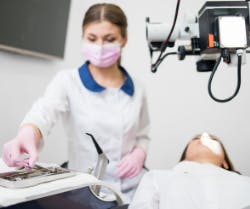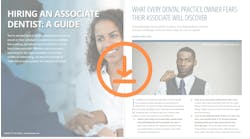When clinic gets real: Five tips for your very first dental hygiene patient
Ask any hygienist, and you will hear how nerve-wracking it was to see a “real patient” for the first time. It is one thing to practice with a dental form or a student partner, but it is taken to a whole new level when delivering actual patient care.
Sure, it’s scary at first, but when we are pushed outside of our comfort zones, it is then that we grow.
Here are a few tips to help you navigate those first patient experiences with the confidence of a pro!
1. Be prepared—Time efficiency balanced with thoroughness is important for success in clinical practice. So much of time management boils down to preparation. Review what you will be doing that day and how to perform those specific components of care.
On the day of the appointment, plan to arrive as early as possible. This way, you will have extra time built in should you run into any delays. It will also give you time to review for your day. Always be sure you have everything you will need for the day ready to go.
Take the time to review the patient chart ahead of time. Familiarize yourself with any red flags in the history and review previous chart notes. If there is anything you can do ahead of time (like looking up medications or conditions), now is the time.
2. You are a professional—Although you are a student to the patient, you are as much of a health-care provider as anyone. They trust you to be the expert. As much as you may feel you don’t know yet, you know so much more than the average person. Regardless of whether you feel nervous, always display professionalism.
Present your best self in your words, actions, and appearance. If you have the jitters (and we’ve all gotten those), as the old adage says, “Never let them see you sweat.” It can be unsettling to any patient, particularly one with dental anxiety, to be with someone who isn’t confidently managing the appointment.
Take a deep breath and remember that you are the expert. There are times for both students and practitioners alike where we may feel “stumped.” We can’t possibly know it all, but use your faculty resources to ask questions and learn.
3. It is not about you—The treatment you perform must always be in the best interest of the patient. It can be hard not to get hung up on passing grades and point deductions. But that way of thinking is a direct conflict to ethical patient care and it doesn’t reflect well on you. The person in the chair is not just a set of teeth or a core requirement, they are a person who is relying upon you to treat them with compassion, respect, and the most comprehensive care you are capable of providing.
4. Not everyone will like you—Patients can be like a box of chocolates in that you never know what you are going to get inside. Most patients (as with chocolate) are enjoyable! One of the many rewards of being an RDH is the relationship with patients. Just like chocolates, though, you may come across one that you don’t care for.
Sometimes you encounter people who may be difficult. Often, this has all to do with them and not with you, so try not to take it personally. Remember, there is a lot of anxiety and fear around dental visits for some people, and it can show itself in many different ways.
The important thing is to stay calm and confident. Your calming influence may be just what that person needs. If you feel a situation is becoming difficult to manage, or you feel the patient is crossing a boundary that you are not comfortable with, it is important to remain in control of the situation and alert a faculty member right away.
5. Enjoy the ride—One of the best things about school clinical experiences is that you are finally getting to see where the rubber meets the road. All that you have been learning and practicing is now happening for real. It’s exciting!
Another advantage is that you are practicing in an environment where there are resources and support all around you. Make the most of this experience.
You are passing through an exciting part of your clinical and professional life. Get yourself ready, and be proactive to make this the best experience for you. With preparation, professionalism, and a willingness to learn, the time will pass quickly, and you’ll be amazed to see how much you learn and grow over the coming months.









